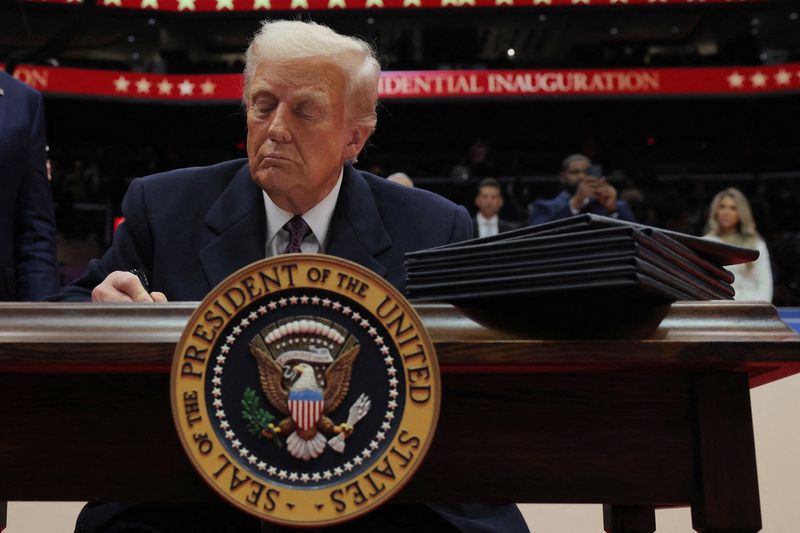By Kanishka Singh and Raphael Satter
WASHINGTON (Reuters) -U.S. President Donald Trump on Monday signed an executive order that he said aims to restore freedom of speech and end censorship, drawing fire from critics who point to his past actions threatening and suing journalists, critics and political opponents.
WHY IT MATTERS
Trump and his Republican allies have accused the administration of Democratic former President Joe Biden of encouraging suppression of free speech on online platforms.
Many of the accusations against the previous administration, however, have centered on government efforts against false claims about vaccines and elections.
The U.S. Supreme Court ruled in June that the Biden administration's contacts with social media companies did not violate America's First Amendment protections around free speech.
CONTEXT
Trump, who took office on Monday, himself faced social media restrictions after an attack on the U.S. Capitol by his supporters on Jan. 6, 2021, following his loss in the 2020 election to Biden.
Trump has over several decades, however, threatened and sued his critics over comments they have made about him. In 2022, he unsuccessfully sued his former presidential campaign foe Hillary Clinton over her comments about his campaign's links to Russia. The judge who threw out the case called it a misuse of the courts.
Trump has also referred to journalists as the "enemy of the people" and has sued five media companies, including the CNN, ABC News, CBS News, publisher Simon & Schuster and the Des Moines Register. The CNN suit was dismissed, ABC settled, and the other lawsuits are ongoing.
University of California, Irvine, Professor David Kaye said the federal government is already barred from interfering with its citizens' First Amendment rights, so the order would not stop behavior that is already prohibited.
He criticised the the order as a "deeply cynical" public relations exercise.
KEY QUOTES

The White House said on Monday after Trump's inauguration: "Over the last four years, the previous administration trampled free speech rights by censoring Americans' speech on online platforms, often by exerting substantial coercive pressure on third parties, such as social media companies, to moderate, de-platform, or otherwise suppress speech that the Federal Government did not approve".
Kaye, a former United Nations Special Rapporteur on free speech issues, said: "You cannot on the one hand say, 'The media is the enemy of the people,' and at the same time say, 'It's the policy of the United States to secure the right of the American people to engage in constitutionally protected speech.' Those two things don't fit together".